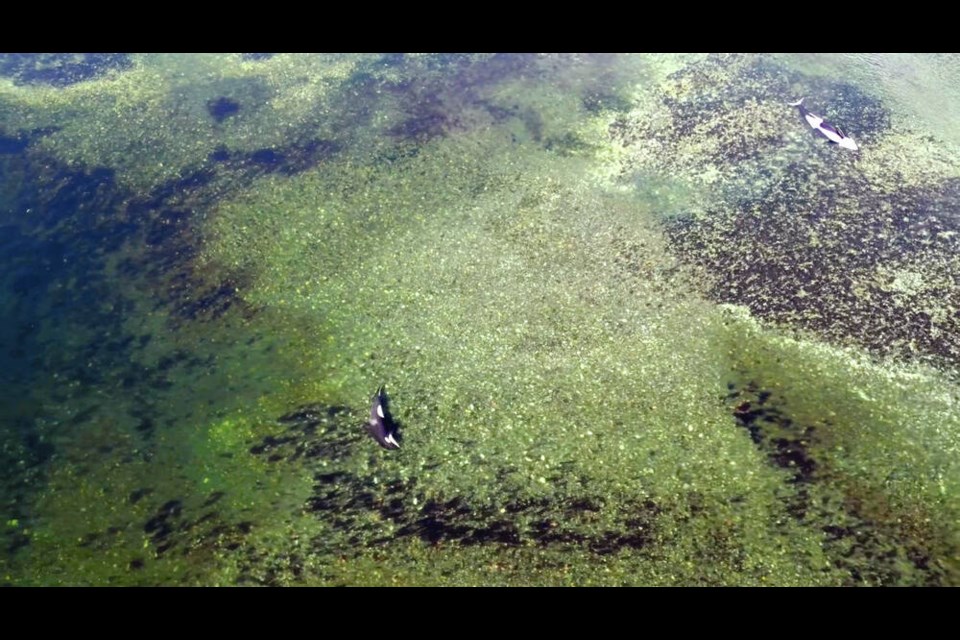Marine scientists and First Nations are in a race against time trying to coax an orphaned killer whale out of a small tidal lagoon on North Vancouver Island to the open ocean in hopes the two-year-old will be reunited with its family pod.
The whale’s mother died after beaching itself Saturday morning while hunting and likely drowned about an hour later as the tide came in.
Department of Fisheries and Oceans scientists who performed a necropsy on the dead mother revealed Monday that she was pregnant.
But the well-being of the calf is the department’s main concern.
“This is a highly complex operation and time is of the essence,” a DFO spokeswoman said Monday. “DFO staff on site are currently focused on doing everything possible to reunite the young whale with its pod.”
Area First Nations, including Ehattesaht Chief Simon John and several members, have been out on the water for hours at a time scouting for orcas and reunification prospects. The DFO said it has several vessels for the process of guiding the calf into open water.
The young calf, born in early 2022, remained around the lagoon near Zeballos where its mother beached itself while chasing a harbour seal early Saturday morning. The mother, identified as T109A3, a 15-year-old Bigg’s killer whale, was stranded while it was alive. Remnants of seal were found in the orca’s mouth.
The DFO called the orca’s beaching the result of “an aggressive predation event.”
Dozens of community members from the Ehattesaht and Nuchatlaht First Nations as well as the village of Zeballos tried in vain to roll the orca from its side onto its belly to prevent the drowning.
The challenge now for First Nations and marine scientists is to reunite the orphaned calf with another pod of orcas, preferably from her own family.
Bay Cetology scientists say with the calf’s calls will be heard for several kilometres if it moves into deeper waters.
Scientists told CHEK news Monday they are using recordings of an aunt in the calf’s matriline, which has a similar dialect to its mother, to coax the young orca out of Esperanza Inlet and to open water so it can find the family pod. The method has been successful in the past, they said.
The T109 matriline, led by Big Momma who is estimated to be at least 47 years old, has about 20 individuals, often travelling in five separate pods but are known to combine at times along the west coast to hunt and socialize.
The calf’s pod, with 13 members, is led by 34-year-old female T109A, also known as Frio.
The Marine Education & Research Society identified the dead orca as T109A3 (Spong), who was born in 2009 and had her calf in 2022. The calf was first spotted in Clayoquot Sound in July that year where the T109As were hunting seals around the outer Islands.
First Nations performed a funeral ceremony for the deceased orca on Saturday, laying cedar boughs over its body, and Kyle Harry performed a prayer song to memorialize the orca, which are culturally significant, “as a thank-you to our hereditary chiefs.”
The orca mother was towed to a nearby site to begin a necropsy on Sunday, but the calf did not follow and stayed in the lagoon. DFO said definitive results on the cause of death may take months to be completed.
Bay Cetology, a team of marine biologists and research technicians based out of Alert Bay, said in a social media post Sunday the orca calf navigated the shallows of the Zeballos causeway and slipped into the lagoon behind its mother at high slack where it began to call out repeatedly.
“It may find its own way out but will likely need some coaxing, as killer whales often do in such situations,” said Jared Towers of Bay Cetology. “Our team has remained on site to document and assist with further efforts by DFO.”
Oceanwise scientists were also on the scene assisting.
DFO acknowledged the Nuchatlaht and Ehattseaht First Nations for their “tremendous efforts to sustain and rescue the whales” and for their ongoing collaboration.
It asked the public to call the Fisheries and Ocean’s Observe, Record, Report Marine Mammal Incident Hotline at 1-800-465-4336, to report occurrences of whales being harassed or disturbed, and instances of collision with whales or whale entanglements.
Mariners who are unable to reach the incident reporting hotline can call the Canadian Coast Guard’s Marine Mammal Desk at 1-833-339-1020.



